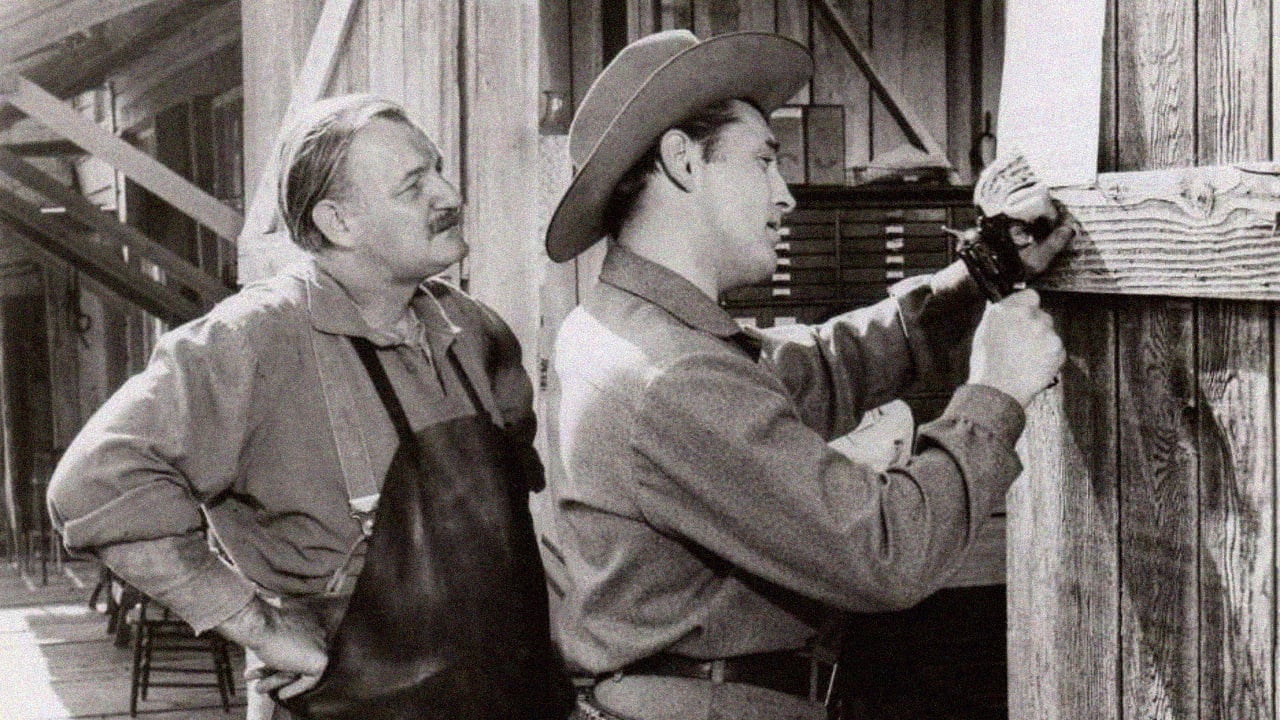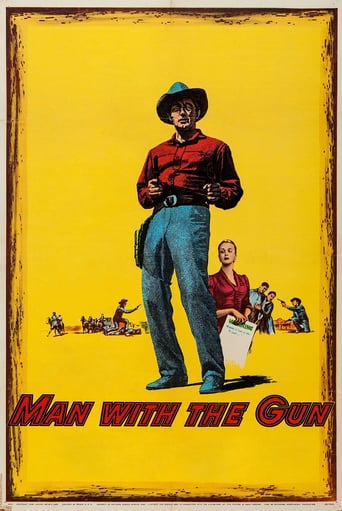

SERIOUSLY. This is what the crap Hollywood still puts out?
... View MorePlot so thin, it passes unnoticed.
... View MoreA Masterpiece!
... View MoreIt's funny, it's tense, it features two great performances from two actors and the director expertly creates a web of odd tension where you actually don't know what is happening for the majority of the run time.
... View MoreThis B+ western deserves a better grade just for exceeding its production values. The town's set is little better than that for TV westerns like Lawman, and the script works mostly by saying as little as possible, forcing the cinematography and direction to show rather than tell. The familiar stock character actors (including some familiar faces like Emile Meyer who rise to their extended screen-time) all support Mitchum, whose pained charisma and cobra-quick violence are essential to the film's success.Other reviewers are right that the basic plot is formulaic, but a few variations maintained interest. Meyer's daughter's gradual infatuation with Mitchum is never directly acknowledged by either character (only by townspeople), but the audience sees her putting herself in his company or staring after him or him sometimes looking back. The villain's spy who watches Mitchum from the hotel porch is obviously up to something, but the viewer is cleverly sealed off from the scenes that expose his plot.Two parts of the script instill suspense and dread that are honest to the story's ambiguous outcome. Twice the town doctor warns that a cure like that Mitchum is offering the town may be worse than the town's disease. Mitchum's character warns of no formulaic redemption when he repeatedly asserts that he's nothing but a gunman and only guns can tame a town—contrasting ominously with formula western heroes who proclaim they don't want to fight, that they're really peace-loving men. One other oddity at the end was Mitchum's taking a bullet so the younger man engaged to Meyer's daughter can prove his manhood. Mitchum's wound seems close to the heart; his and the doctor's initial conversation sounds fatal; and Mitchum reclines in profile like a fallen classical hero. Maybe the studio insisted on a proper romantic ending, though, for then Mitchum and his long-lost wife talk as though he'll hang up his guns and they'll start over, climaxing in a kiss at "The End." B movies like this count as precious jewels and fascinating records of mid-20c culture.
... View MoreIn the Old west there are always the men who live breathe violence and the women who hold their breath. A famous ¨town tamer¨ named Clit Tollinger(Robert Mitchum) comes hired by the citizens to rid the gunslingers ( Leo Genn, Claude Atkins, among others), Baronland's hoodlums. There he meets the blacksmith (Emile Meyer) , his daughter (Karen Sharpe), her boyfriend(John Lupton), the marshal(Henry Hull) and the Saloon owner (Ted De Corsia). Clint as lawman is appointed deputy to bring peace and puts some cartels saying the following : ¨ Warning , wearing of guns or other weapons in town is banned. Check all hardware at the marshal's office ¨. Clint finds his ex-girlfriend, a local madame (Jan Sterling) in charge of the Saloon girls( Angie Dickinson, Barbara Lawrence, among them). But the town council afraid the raw methods carried out by Clint . At the end the kingpin landowner appears and attempts to murder Tollinger with his own hands.This is a tremendously exciting story of a sheriff-for-hire who had only one more killing to go. It begins as a slow-moving Western but follows to surprise us with dark characters and solid plot. The tale is almost grim , a pacifier comes to a town just in time to make sure its citizenry but later the events get worse . The highlights are the burning at Saloon and the climatic showdown at the ending. Phenomenal and great role for Robert Mitchum as avenger angel and bitter gunfighter, he's the whole show. Vivid and lively musical score by Alex North (Spartacus, Cleopatra), Atmospheric cinematography in black and white by Lee Garmes. The motion picture is stunningly realized by Richard Wilson (Al Capone , Three in Attic) who made good Western as ¨Invitation to a gunfighter and ¨Zane Grey¨ episodes. Watchable results for this offbeat Western.
... View MoreLeo Gordon, dressed in black, shoots a little boy's dog just because it barks at him. "Town tamer" Mitchum at one point runs amok in a saloon. There are some very mean characters in this psychological western, which at least does show that meanness is a major human psychological trait. It also has a pretty good, if brief, "catharsis" moment at the end.Terrific supporting cast- bombastic Henry Hull (Jesse James '39, Return of Frank James '50), excellent but underused Maidie Norman, and an early Claude Akins bad-guy performance. You are guaranteed to notice a very young Angie Dickinson (and her long legs).Mitchum manages to somehow humanize a wooden character but its just a thankless role. Barbara Lawrence is terrific and noticeable and far outshines a boring attempt at "drama" by Jan Sterling. Not really Sterling's fault- the character is written poorly.A good example of film music composition by North. It features a melodic main theme, but also a separate striking dramatic theme. Notice when he brilliantly overlays one theme over the other as Mitchum's character seems to be cracking up.This is a black-and-white set-bound psychological Western, which in other movies can be a formula for dullsville. However, "Man With The Gun" moves at a good pace and is made worthwhile by a great cast. You definitely will enjoy their performances.
... View MoreClint Tollinger arrives in a small western town looking for his estranged wife, who left him and now runs the local show saloon. His presence is greeting by suspicion but when the town leaders discover the nature of Tollinger's business they propose that they employ him to clean up the town of the problem of Dade Holman's violent influence. The solution may be just as bad as the problem but they take the risk.With a nice dark character with a lot of anger and pain in the front of the film this western is enjoyable tough. Although the plot is fairly typical of a western b-movie, the tone and edge to it means that it comes over as much more. The basic story sees Tollinger taking on the rule of Holman but it has undercurrents of pain and anger as the lead confronts his wife. We meet Tollinger as a gentle, quiet man but gradually we see him to be violent, heartless and full of bitterness; it is solid development that is at the heart of the film's dark tone. Of course it still follows the genre traditions and will appeal to fans of such while also having enough else going on to make it differ from the Technicolor westerns of the same period.Wilson is responsible for the dark tone as both writer and director; shot is stark black and white he frames some interesting shots and is not afraid to be aggressive or shocking considering the period. Mitchum takes to his character well and always seemed to enjoy the darker more complex characters that some of his westerns would serve him up with. Sterling does well with her firm character until near the end where she becomes more of a genre staple. Support behind these two is roundly good but the film is very much Mitchum's and he knows it.Overall it is a solid western that gradually gets down to just going where you expect it to. However for the vast majority it has a dark tone and feel to it that makes it much more interesting and more likely to appeal beyond the limitations of those that like the colourful b-movie westerns of the period.
... View More